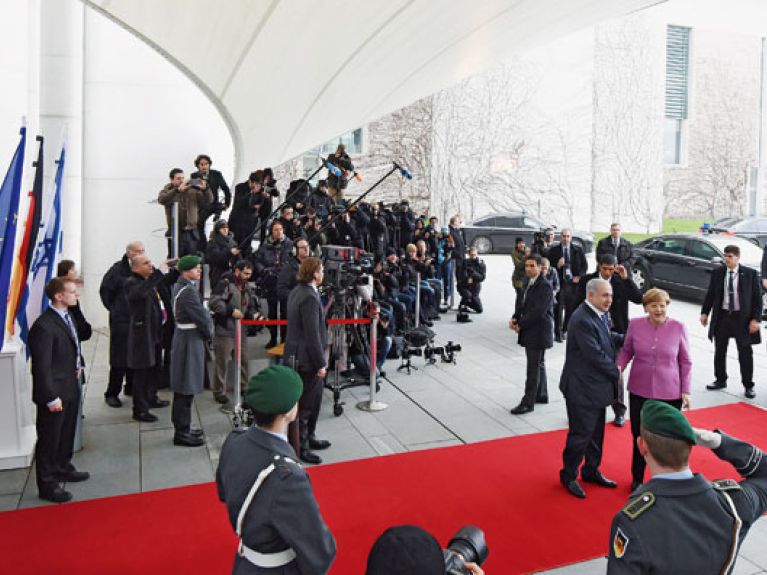Frank talks – German-Israeli Intergovernmental Consultations
New fields of cooperation were outlined at the sixth meeting of the German and Israeli cabinets in Berlin.

The German-Israeli Intergovernmental Consultations are something special in the otherwise unique relations between the two countries: this top-level dialogue forum was established in 2008 – on the occasion of the 60th anniversary of the founding of the State of Israel. For Israel, Germany was the first partner with which a regular, high-level exchange of this kind was agreed. And for Germany, Israel was the first non-European country with which regular intergovernmental consultations were held. At the time, the Federal Chancellor wrote in the visitors’ book of Yad Vashem, Israel’s memorial to the victims of the Holocaust: “In the full awareness of the responsibility of Germany for the Holocaust, the German government is underlining, with the first German-Israeli Government Consultations, its determination that the two governments should work together to shape the future.”
Since then the cabinets of the two governments have met annually. In autumn 2015, however, during the jubilee year celebrating 50 years of diplomatic relations between the two countries, the meeting had to be postponed because of the wave of violence in Israel and the Palestinian territories. The sixth intergovernmental consultations were held later in Berlin in February 2016.
Both sides then honoured the increase in bilateral cooperation during the past 50 years, the extent of which no one would have dared to imagine in 1965. Federal Chancellor Angela Merkel and Prime Minister Benjamin Netanyahu explicitly thanked “the many people who work continuously to promote and deepen the ties between their countries and their societies”. And they reiterated their shared goal of continuing to enhance the partnership between the two states. “When we are in Germany, we know we’re among good friends,” said Netanyahu during the press conference. Federal Chancellor Merkel also spoke frankly about differences of opinion on various questions: “Above all, one must always continue to talk, even when there are differences of opinion.” In the run-up to the consultations, Federal Foreign Minister Frank-Walter Steinmeier also referred to the open atmosphere of discussion: “These meetings are not polite, diplomatic routine encounters. I can’t deny that there are often heated discussions. But precisely this is the mark of a close friendship: a willingness to speak frankly.”
The gathering primarily looked towards the future: “Challenges of an Open Society in the 21st Century” was the heading Federal Chancellor Merkel and Prime Minister Netanyahu gave their joint statement. One of the key topics of the consultations was “Innovation in the 21st Century”: Germany and Israel want to further strengthen and deepen their already close cooperation in the field of innovation at both the bilateral level and within Horizon 2020, the European Union Framework Programme for Research and Innovation. Above all, it is intended to cooperate even more closely in the areas of water technology, civil security research, battery research, ocean research and cancer research. Technology transfer with small and medium-sized enterprises as well as business start-ups is to play a special role here – initially in the field of applied nanotechnology. More cooperation is also intended on renewable energies, digitalisation and electromobility, fields which are important to both countries.
Another key area of the consultations was headed “Responsibility for our Societies”: the governments recognised that urgent action is needed to address the threat of climate change. They also welcomed the adoption of the ambitious, universally applicable 2030 Agenda for Sustainable Development.
The government leaders expressed their satisfaction with the success of the existing cooperation between MASHAV, Israel’s Agency for International Development Cooperation, and the Federal Ministry for Economic Cooperation and Development in the German-Israeli Africa Initiative (see issue 4/2015). Another area of society in which it was agreed that cooperation should be intensified is cyber security, which aims to make IT systems more secure and the Internet an area of freedom and security.
After the talks, the Federal Chancellor emphasised that she was grateful they had discussed security and foreign policy questions, such as the conflict in Syria, as well as a large number of other subjects. There will certainly also be enough topics for discussion at the next intergovernmental consultations. They are scheduled to take place in 2017 – in Jerusalem. ▪

